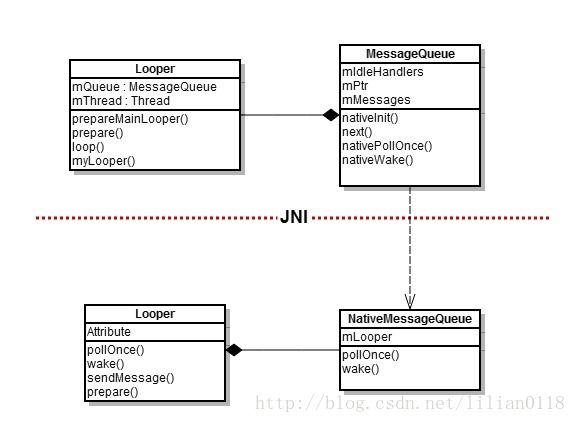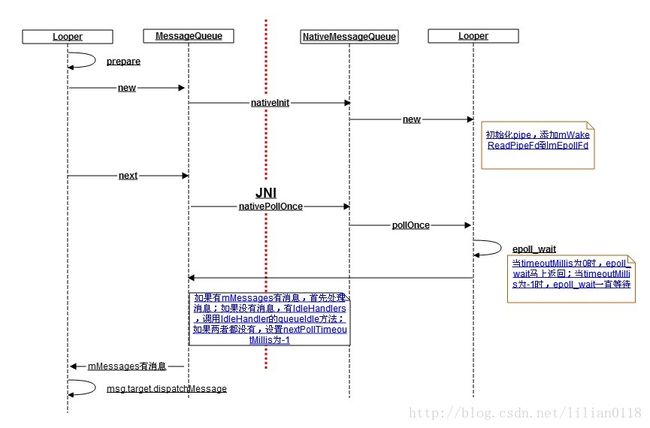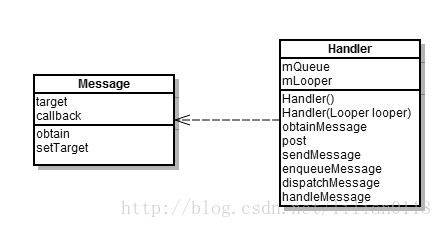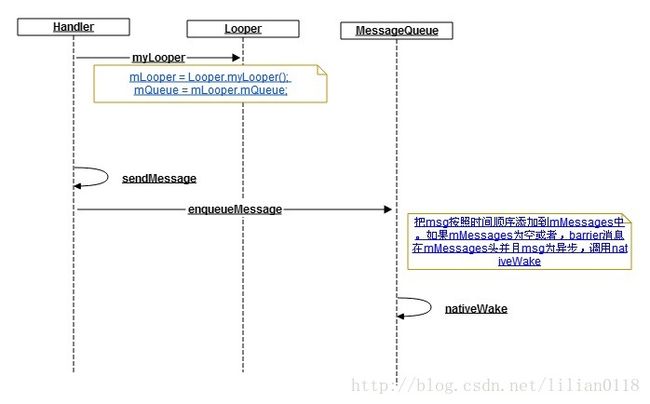Android Looper和Handler分析
Android应用程序是通过消息来驱动的,每个应用程序都有一个Main looper在ActivityThread中创建。我们这一节中就主要来分析下Looper和Handler的实现机制,首先来简单介绍一下它们的关系:
▪Thread、Looper、MessageQueue、Handler的关系
–Thread线程是整个Looper循环执行的场所
–Looper消息泵,不断的从MessageQueue中读取消息并执行,Looper就是一个无限循环,Looper中包含MessageQueue
–MessageQueue消息队列,负责存放消息
–Looper分发消息给Handler执行;Handler同时可以向MessageQueue添加消息
我们通过下面一个简单的程序来看一下如何使用Looper和Handler:
class LooperThread extends Thread {
public Handler mHandler;
public void run() {
Looper.prepare();
mHandler = new Handler() {
public void handleMessage(Message msg) {
// process incoming messages here
}
};
Looper.loop();
}
}
首先在一个Thread中需要先调用Looper.prepare方法去做好初始化工作,其实就是实例化一个MessageQueue。然后调用Looper.loop就可以开始循环了。那我们首先先看一下prepare方法:
public static void prepare() {
prepare(true);
}
private static void prepare(boolean quitAllowed) {
if (sThreadLocal.get() != null) {
throw new RuntimeException("Only one Looper may be created per thread");
}
sThreadLocal.set(new Looper(quitAllowed));
}
private Looper(boolean quitAllowed) {
mQueue = new MessageQueue(quitAllowed);
mThread = Thread.currentThread();
}可以看到在prepare方法中主要是构造一个Looper对象并存放在sThreadLocal中,sThreadLocal是线程本地存储的变量,每个线程有这么一块区域来存储线程的数据,这些数据不会被进程中其它线程所修改。在Looper的构造函数中实例化一个MessageQueue对象:
MessageQueue(boolean quitAllowed) {
mQuitAllowed = quitAllowed;
mPtr = nativeInit();
}
static jint android_os_MessageQueue_nativeInit(JNIEnv* env, jclass clazz) {
NativeMessageQueue* nativeMessageQueue = new NativeMessageQueue();
if (!nativeMessageQueue) {
jniThrowRuntimeException(env, "Unable to allocate native queue");
return 0;
}
nativeMessageQueue->incStrong(env);
return reinterpret_cast(nativeMessageQueue);
} 在MessageQueue的构造函数中通过JNI调用到android_os_MessageQueue_nativeInit方法,在这个方法里面,构造一个NativeMessageQueue对象,并在Java层的MessageQueue成员变量mPtrl保存NativeMessageQueue对象的内存地址,以便后面Java层调用NativeMessageQueue的其它方法。我们再来看一下NativeMessageQueue的构造函数:
NativeMessageQueue::NativeMessageQueue() : mInCallback(false), mExceptionObj(NULL) {
mLooper = Looper::getForThread();
if (mLooper == NULL) {
mLooper = new Looper(false);
Looper::setForThread(mLooper);
}
}
在Native层的MessageQueue中,也通过TLS技术在线程中保存是否创建了底层Looper,如果有创建就可以通过getForThread返回;如果没有,getForThread将返回NULL。当然这里肯定会返回NULL,这里就将构造一个Looper对象并设置到这个线程的TLS中。我们来看Looper的构造函数:
Looper::Looper(bool allowNonCallbacks) :
mAllowNonCallbacks(allowNonCallbacks), mSendingMessage(false),
mResponseIndex(0), mNextMessageUptime(LLONG_MAX) {
int wakeFds[2];
int result = pipe(wakeFds);
LOG_ALWAYS_FATAL_IF(result != 0, "Could not create wake pipe. errno=%d", errno);
mWakeReadPipeFd = wakeFds[0];
mWakeWritePipeFd = wakeFds[1];
result = fcntl(mWakeReadPipeFd, F_SETFL, O_NONBLOCK);
LOG_ALWAYS_FATAL_IF(result != 0, "Could not make wake read pipe non-blocking. errno=%d",
errno);
result = fcntl(mWakeWritePipeFd, F_SETFL, O_NONBLOCK);
LOG_ALWAYS_FATAL_IF(result != 0, "Could not make wake write pipe non-blocking. errno=%d",
errno);
mIdling = false;
// Allocate the epoll instance and register the wake pipe.
mEpollFd = epoll_create(EPOLL_SIZE_HINT);
LOG_ALWAYS_FATAL_IF(mEpollFd < 0, "Could not create epoll instance. errno=%d", errno);
struct epoll_event eventItem;
memset(& eventItem, 0, sizeof(epoll_event)); // zero out unused members of data field union
eventItem.events = EPOLLIN;
eventItem.data.fd = mWakeReadPipeFd;
result = epoll_ctl(mEpollFd, EPOLL_CTL_ADD, mWakeReadPipeFd, & eventItem);
LOG_ALWAYS_FATAL_IF(result != 0, "Could not add wake read pipe to epoll instance. errno=%d",
errno);
}
Looper的构造函数比较简单,首先构造一个pipe,一端用于读,另一端用于写。然后使用epoll将它mWakeReadPipeFd添加到mEpollFd中。后面我们就可以通过在mWakeWritePipeFd端写数据,让epoll_wait跳出等待。当这里Looper.prepare函数就介绍完了,我们先来看一下上面说到的几个类的关系图:
然后我们再来分析Looper.loop方法:
public static void loop() {
final Looper me = myLooper();
final MessageQueue queue = me.mQueue;
Binder.clearCallingIdentity();
final long ident = Binder.clearCallingIdentity();
for (;;) {
Message msg = queue.next(); // might block
if (msg == null) {
return;
}
msg.target.dispatchMessage(msg);
final long newIdent = Binder.clearCallingIdentity();
msg.recycle();
}
}
首先myLooper返回ThreadLocal存储的前面构造的Looper对象。然后调用Looper中的MessageQueue的next方法,next方法返回下一个消息(如果有,如果没有就一直等待),当然一般情况下不会返回空消息。并调用msg.target的dispatchMessage方法,这里的target其实就是Handler,我们后面再来分析。先来看一下MessageQueue的next方法:
Message next() {
int pendingIdleHandlerCount = -1; // -1 only during first iteration
int nextPollTimeoutMillis = 0;
for (;;) {
if (nextPollTimeoutMillis != 0) {
Binder.flushPendingCommands();
}
nativePollOnce(mPtr, nextPollTimeoutMillis);
synchronized (this) {
final long now = SystemClock.uptimeMillis();
Message prevMsg = null;
Message msg = mMessages;
if (msg != null && msg.target == null) {
do {
prevMsg = msg;
msg = msg.next;
} while (msg != null && !msg.isAsynchronous());
}
if (msg != null) {
if (now < msg.when) {
nextPollTimeoutMillis = (int) Math.min(msg.when - now, Integer.MAX_VALUE);
} else {
mBlocked = false;
if (prevMsg != null) {
prevMsg.next = msg.next;
} else {
mMessages = msg.next;
}
msg.next = null;
msg.markInUse();
return msg;
}
} else {
nextPollTimeoutMillis = -1;
}
if (mQuitting) {
dispose();
return null;
}
if (pendingIdleHandlerCount < 0
&& (mMessages == null || now < mMessages.when)) {
pendingIdleHandlerCount = mIdleHandlers.size();
}
if (pendingIdleHandlerCount <= 0) {
// No idle handlers to run. Loop and wait some more.
mBlocked = true;
continue;
}
if (mPendingIdleHandlers == null) {
mPendingIdleHandlers = new IdleHandler[Math.max(pendingIdleHandlerCount, 4)];
}
mPendingIdleHandlers = mIdleHandlers.toArray(mPendingIdleHandlers);
}
for (int i = 0; i < pendingIdleHandlerCount; i++) {
final IdleHandler idler = mPendingIdleHandlers[i];
mPendingIdleHandlers[i] = null; // release the reference to the handler
boolean keep = false;
try {
keep = idler.queueIdle();
} catch (Throwable t) {
Log.wtf("MessageQueue", "IdleHandler threw exception", t);
}
if (!keep) {
synchronized (this) {
mIdleHandlers.remove(idler);
}
}
}
pendingIdleHandlerCount = 0;
nextPollTimeoutMillis = 0;
}
}next函数虽然比较长,但它的逻辑还是比较简单的,主要可以分为下面三个步骤:
▪调用nativePollOnce去完成等待。初始值nextPollTimeoutMillis为0,epoll_wait会马上返回,当nextPollTimeoutMillis为-1,epoll_wait会一直等待
▪当nativePollOnce返回后,获取mMessages中消息。如果mMessages没有消息,就设置nextPollTimeoutMillis为-1,表示下一次epoll_wait时一直等待。如果mMessages中有消息,并且当前系统时间不小于messge待处理的时间,就返回这个消息
▪如果没有消息处理,并且当前有IdleHandlers,就调用IdleHandlers的queueIdle方法,并修改nextPollTimeoutMillis为0。IdleHandlers用于在MessageQueue中没有消息时做回调使用。
在上面的三个步骤中,最重要的当然是nativePollOnce,我们来简单分析一下:
void NativeMessageQueue::pollOnce(JNIEnv* env, int timeoutMillis) {
mInCallback = true;
mLooper->pollOnce(timeoutMillis);
mInCallback = false;
if (mExceptionObj) {
env->Throw(mExceptionObj);
env->DeleteLocalRef(mExceptionObj);
mExceptionObj = NULL;
}
}
int Looper::pollOnce(int timeoutMillis, int* outFd, int* outEvents, void** outData) {
int result = 0;
for (;;) {
if (result != 0) {
return result;
}
result = pollInner(timeoutMillis);
}
}
int Looper::pollInner(int timeoutMillis) {
int result = ALOOPER_POLL_WAKE;
mResponses.clear();
mResponseIndex = 0;
// We are about to idle.
mIdling = true;
struct epoll_event eventItems[EPOLL_MAX_EVENTS];
int eventCount = epoll_wait(mEpollFd, eventItems, EPOLL_MAX_EVENTS, timeoutMillis);
// No longer idling.
mIdling = false;
// Acquire lock.
mLock.lock();
if (eventCount < 0) {
if (errno == EINTR) {
goto Done;
}
ALOGW("Poll failed with an unexpected error, errno=%d", errno);
result = ALOOPER_POLL_ERROR;
goto Done;
}
// Check for poll timeout.
if (eventCount == 0) {
#if DEBUG_POLL_AND_WAKE
ALOGD("%p ~ pollOnce - timeout", this);
#endif
result = ALOOPER_POLL_TIMEOUT;
goto Done;
}
for (int i = 0; i < eventCount; i++) {
int fd = eventItems[i].data.fd;
uint32_t epollEvents = eventItems[i].events;
if (fd == mWakeReadPipeFd) {
if (epollEvents & EPOLLIN) {
awoken();
} else {
}
} else {
}
}
Done: ;
mNextMessageUptime = LLONG_MAX;
mLock.unlock();
return result;
}因为Native层Looper需要支持底层自己的消息处理机制,所以pollOnce的代码中添加处理底层Message的代码,我们抛开这部分的代码,其实pollOnce就是调用epoll_wait去等待时间发生。当timeoutMillis为0时,它会立即返回;当timeoutMillis为-1时,它会一直等待,知道我们调用Looper::wake方法向mWakeWritePipeFd写入数据。我们简要来看一下上面介绍prepare和loop的流程:
我们再来分析下Handler和Message的关系,并介绍如何向MessageQueue中添加消息,以便epoll_wait能够返回。首先来看Handler的构造函数,Handler有很多构造函数,我们可以把Handler绑定到一个Looper上,也可以不带Looper参数,它会默认的绑定到我们的MainThread中:
public Handler(Callback callback) {
this(callback, false);
}
public Handler(Looper looper) {
this(looper, null, false);
}
public Handler(Callback callback, boolean async) {
mLooper = Looper.myLooper();
if (mLooper == null) {
throw new RuntimeException(
"Can't create handler inside thread that has not called Looper.prepare()");
}
mQueue = mLooper.mQueue;
mCallback = callback;
mAsynchronous = async;
}
public Handler(Looper looper, Callback callback, boolean async) {
mLooper = looper;
mQueue = looper.mQueue;
mCallback = callback;
mAsynchronous = async;
}上面列举了两种Handler的构造方法,它主要从当前Looper中得到MessageQueue对象,并保存在mQueue中,后面我们就可以调用mQueue的方法来添加消息了。来看一下Handler和Message的类图:
来看一下一个简单的sendMessage方法,当然Message对象可以通过Message的静态方法obtain获得:
public final boolean sendMessage(Message msg)
{
return sendMessageDelayed(msg, 0);
}
public final boolean sendMessageDelayed(Message msg, long delayMillis)
{
if (delayMillis < 0) {
delayMillis = 0;
}
return sendMessageAtTime(msg, SystemClock.uptimeMillis() + delayMillis);
}
public boolean sendMessageAtTime(Message msg, long uptimeMillis) {
MessageQueue queue = mQueue;
return enqueueMessage(queue, msg, uptimeMillis);
}
private boolean enqueueMessage(MessageQueue queue, Message msg, long uptimeMillis) {
msg.target = this;
if (mAsynchronous) {
msg.setAsynchronous(true);
}
return queue.enqueueMessage(msg, uptimeMillis);
}这里经过一系列的方法,最终调用到MessageQueue的enqueueMessage函数:
boolean enqueueMessage(Message msg, long when) {
if (msg.target == null) {
throw new AndroidRuntimeException("Message must have a target.");
}
synchronized (this) {
msg.when = when;
Message p = mMessages;
boolean needWake;
if (p == null || when == 0 || when < p.when) {
msg.next = p;
mMessages = msg;
needWake = mBlocked;
} else {
needWake = mBlocked && p.target == null && msg.isAsynchronous();
Message prev;
for (;;) {
prev = p;
p = p.next;
if (p == null || when < p.when) {
break;
}
if (needWake && p.isAsynchronous()) {
needWake = false;
}
}
msg.next = p; // invariant: p == prev.next
prev.next = msg;
}
// We can assume mPtr != 0 because mQuitting is false.
if (needWake) {
nativeWake(mPtr);
}
}
return true;
}
enqueueMessage检查mMessages中是否有消息,如果没有,就把它当前头添加到mMessages中,并更新needWake为mBlocked,mBlocked会在mMessages为空并且没有IdleHandlers时置为true,这时timeoutMillis为-1,epoll_wait会无限等待,所以我们需要调用natvieWake唤醒它;如果在mMessages有消息,我们一般情况下不需要调用nativeWake来唤醒,除非我们当前头部是barrier消息(target为NULL)并且待send的消息是第一个异步的,这里就将调用nativeWake来唤醒它。这里注意的是异步消息不会被barrier消息打断,并且异步消息可以在它之前的同步消息之前执行。再来看一下nativeWake函数的实现:
static void android_os_MessageQueue_nativeWake(JNIEnv* env, jclass clazz, jint ptr) {
NativeMessageQueue* nativeMessageQueue = reinterpret_cast(ptr);
return nativeMessageQueue->wake();
}
void Looper::wake() {
ssize_t nWrite;
do {
nWrite = write(mWakeWritePipeFd, "W", 1);
} while (nWrite == -1 && errno == EINTR);
if (nWrite != 1) {
if (errno != EAGAIN) {
ALOGW("Could not write wake signal, errno=%d", errno);
}
}
} 这里其实就是向pipe的写端写入一个"W"字符,这样epoll_wait就可以跳出等待了。我们先来看一下上面介绍的sendMessage的流程:
当Message的next方法返回一个消息后,后面就将调用Handler的dispatchMessage去处理它:
public void dispatchMessage(Message msg) {
if (msg.callback != null) {
handleCallback(msg);
} else {
if (mCallback != null) {
if (mCallback.handleMessage(msg)) {
return;
}
}
handleMessage(msg);
}
}当我们post一个Runnable时,Message的callback就为这个Runnable,如果Runnable不为空,直接调用callback.run方法。如果msg.callback为空,但mCallback不为空,则调用mCallback的handleMessage方法。最后两者都没有的情况下才调用Handler的handleMessage方法,所以我们在程序中一般重载handleMessage来处理消息即可。下面是dispatchMessage的流程图:
我们来看下面这段代码:
class LooperThread extends Thread {
public Looper myLooper = null;
public void run() {
Looper.prepare();
myLooper = Looper.myLooper();
Looper.loop();
}
}
{
LooperThread myLooperThread = new LooperThread();
myLooperThread.start();
Looper mLooper = myLooperThread.myLooper;
Handler mHandler = new Handler(mLooper);
mHandler.sendEmptyMessage(0);
}这在我们程序中会经常用到,先在一个Thread中准备好Looper,然后使用这个Looper绑定到另外一个Handler上面。但上面的程序有点bug,当myLooperThread还没执行到myLooper = Looper.myLooper()这一行时,主线程接着运行并调用Handler的构造函数,因为此时MessageQueue还没准备好,所以这里会抛出一个异常。为了处理这种问题,Android提供了HandlerThread这个类来完美解决这个问题:
public HandlerThread(String name, int priority) {
super(name);
mPriority = priority;
}
public void run() {
mTid = Process.myTid();
Looper.prepare();
synchronized (this) {
mLooper = Looper.myLooper();
notifyAll();
}
Process.setThreadPriority(mPriority);
onLooperPrepared();
Looper.loop();
mTid = -1;
}
public Looper getLooper() {
if (!isAlive()) {
return null;
}
// If the thread has been started, wait until the looper has been created.
synchronized (this) {
while (isAlive() && mLooper == null) {
try {
wait();
} catch (InterruptedException e) {
}
}
}
return mLooper;
}通过wait和notifyAll机制完美解决了以上的问题。看来我们在程序中还是要多使用HandlerThread。下面对上面的介绍做一个简单的总结:
▪Handler的处理过程运行在创建Handler的线程里
▪一个Looper对应一个MessageQueue
▪一个线程对应一个Looper
▪一个Looper可以对应多个Handler
▪当MessageQueue中没有消息时,IdleHandlers会被回调
▪MessageQueue中的消息本来是有序的处理,但可以通过barrier消息将其中断(打乱)




